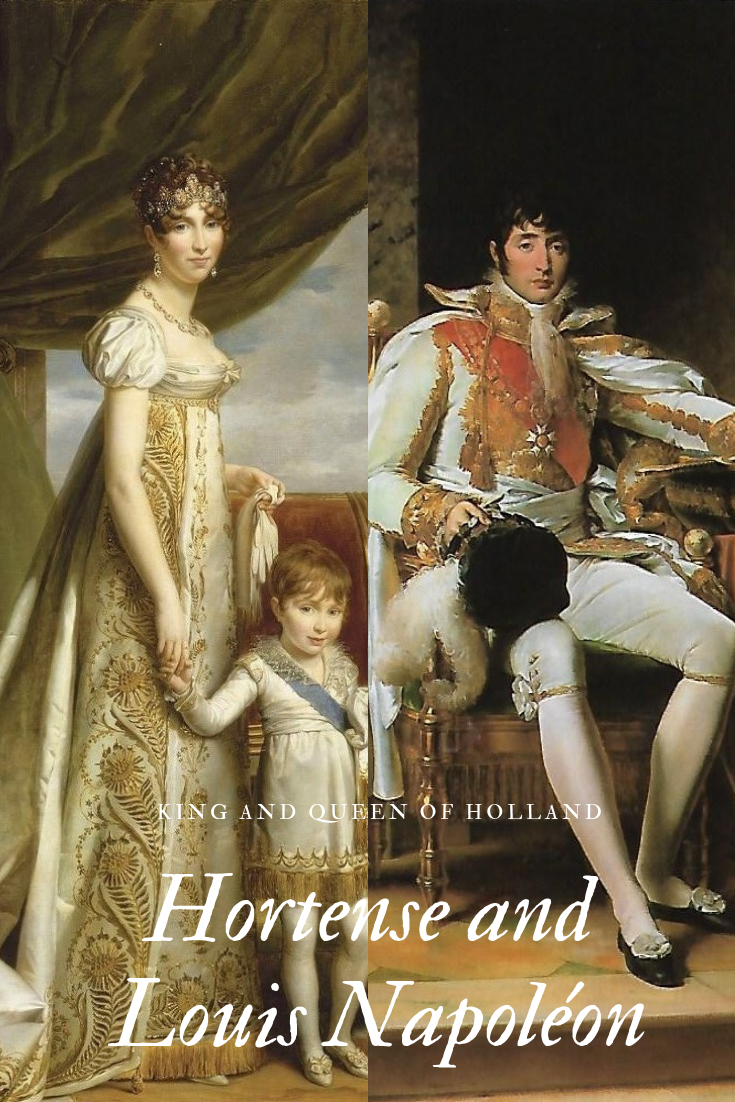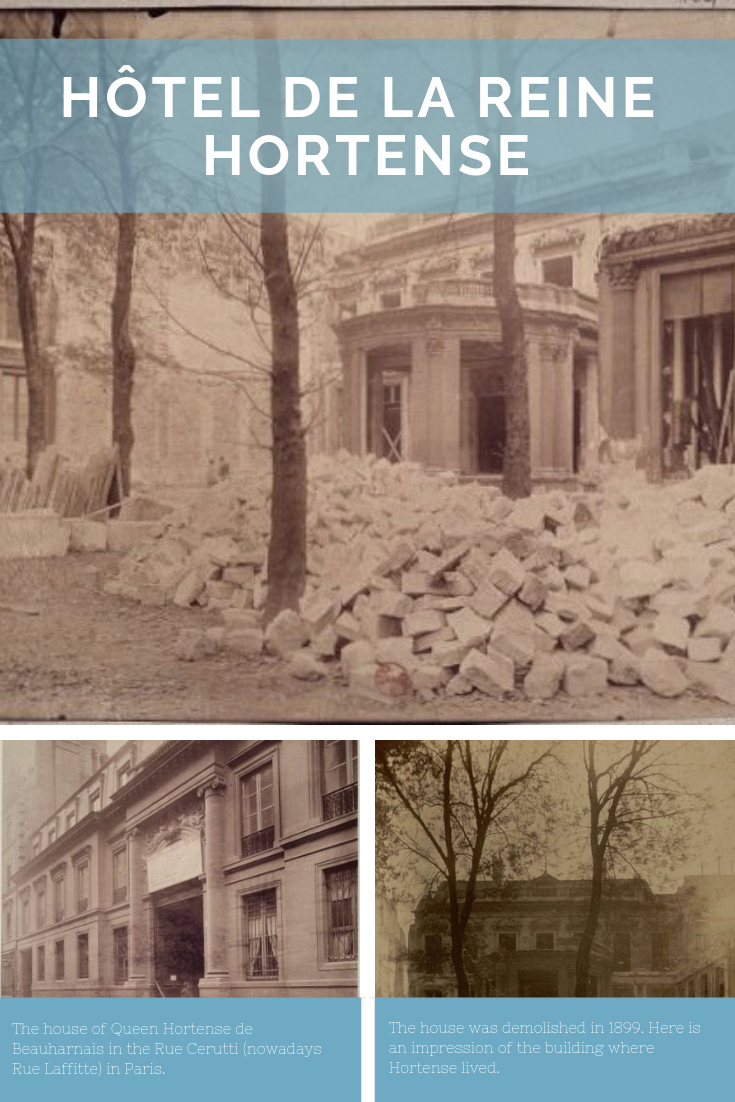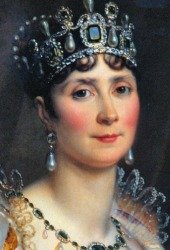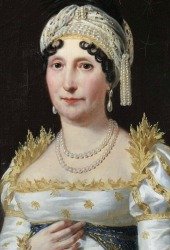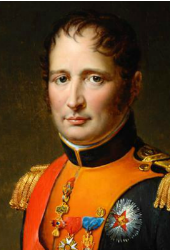Hortense de Beauharnais
Reine de Hollande (queen of Holland)
Hortense de Beauharnais had a tumultuous life. It reads like a book, you wouldn't believe this all happened to one person, but it's all true.
DISCLOSURE: I get commissions for purchases made through some of the links in this article.
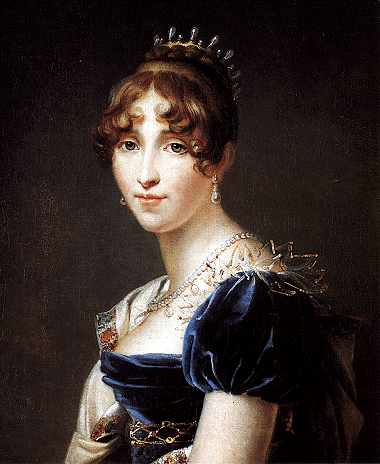 Hortense de Beauharnais
Hortense de BeauharnaisShe danced barefoot amongst the slaves on a tropical island, fled a slave riot with only the clothes on her back, wandered the streets of Paris during the French revolution, while both her parents in prison waiting for their turn at the guillotine.
After she survived all that, she became the stepdaughter and one of the intimates of Emperor Napoleon.
She gained and lost a kingdom (and the king that came with it) and had children, one of them illegitimate with her only true love. She became an outlaw and fled several countries with her legitimate son who was crowned Emperor Napoleon III of France.
She did not live long enough to witness that though. Hortense de Beauharnais died in 1837 at the age of fifty-four. Sheis buried next to her famous mother, Joséphine de Beauharnais in the Saint-Pierre-Saint-Paul church in Rueil-Malmaison.
Her son Charles-Louis Napoléon became Emperor of the French from 1852 to 1870 as Napoleon III.
Hortense’s childhood on Martinique
Shortly after Hortense de Beauharnais is born on 10 April 1783, her parents Alexandre and Rose de Beauharnais get divorced. Hortense has an older brother, Eugène, who was born in 1781. Their mother decides to go back to her family on the island of Martinique and takes only Hortense with her. Eugene stays in France with his father.
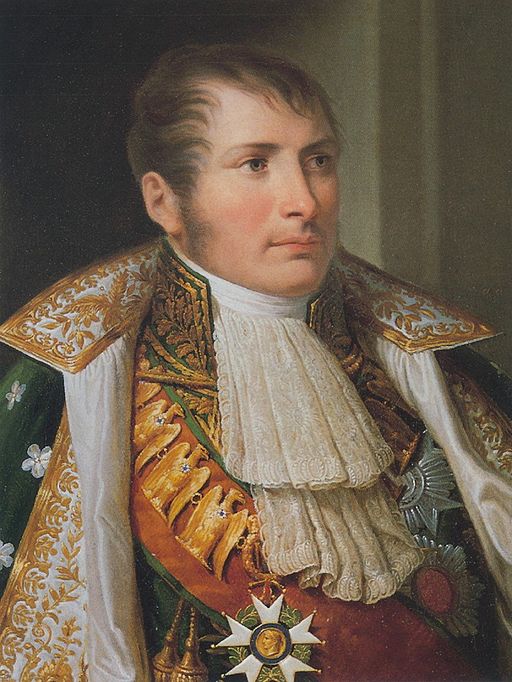 Eugène de Beauharnais, brother of Hortense de Beaharnais
Eugène de Beauharnais, brother of Hortense de BeaharnaisAt Martinique, Hortense has a simple and warm life, always close to her mother and grandmother, adored by the slaves on the tiny plantation of her mother's family. All-day she was singing and dancing and enjoying the sun.
Rose had an agreement with her husband. She had to leave her son Eugene in France when she left for Martinique Now she is torn between the longing for her son and the bond with her family on the island. Then history makes the decision for her. Rose and Hortense have to flee the island of Martinique during a slave rebellion. Events develop so fast and it gets dangerous for the French women quickly. They leave the island with only the cloth on their back. They do not have the change to say goodbye to anyone.
In November 1790 their ship docks at Toulon, France. Mother and daughter are stranded there, freezing in their tropical outfits. Rose needs to use all her charms to get to her family. They were just in time for the start of the French Revolution.
Paris, during the revolution
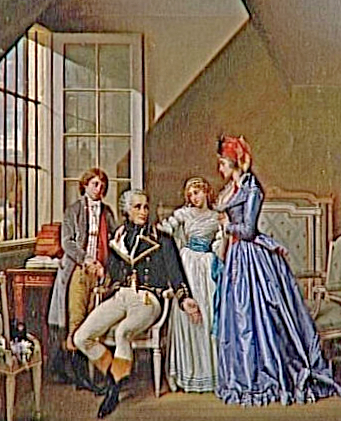 Visit of Josephine and her children to her husband in the prison of Luxembourg, 1794 by Hector Viger. This is an imaginary piece, Josephine never visited Alexandre, she was in prison herself.
Visit of Josephine and her children to her husband in the prison of Luxembourg, 1794 by Hector Viger. This is an imaginary piece, Josephine never visited Alexandre, she was in prison herself.Hortense and Rose are very happy to be reunited with Eugene. Hortense would have a strong bond with her brother throughout her life, and this next period of her life may well be one of the reasons.
Things
don't look good for aristocrats in France in this period. On April 18th,
1794 Rose is arrested, her ex-husband has already been in prison since March
2nd.
The children, aged 13 and 11, are on
their own now. Every day they walk to the Carmes Prison where their mother was
held, and bring clothes, food, letters and drawings. Until one day the guards
prohibits the visits and they have to find other ways to communicate. They once
manage to smuggle Rose's dog into the prison once, carrying a message from the
children. Another time they manage to get a glimpse of their parents from a
garden at the back of the prison. They are caught though, and the windows are blocked
up immediately after that.
During this time Hortense and Eugene frequently visit the Hôtel de Salm, the palace of Frederick III, Prince of Salm-Kyrburg. Frederick is the brother of Princess Amalie of Hohenzollern-Sigmaringen, a dear friend of Rose. The rumour goes that Amalie is the lover of Alexandre de Beauharnais. The princess and the children share the same fears, Frederick is also taken to the Carmen prison. The treat of being arrested is always vivid, for the princess, and even for the children de Beauharnais.
 Alexandre de Beauharnais, father of Hortense de Beauharnais. He is executed under the guillotine on 22 July 1794
Alexandre de Beauharnais, father of Hortense de Beauharnais. He is executed under the guillotine on 22 July 1794On 22 July Hortense's father Alexandre de Beauharnais is executed, together with Prince Frederick and some 44 others. Hortense’s mother Rose really fears for her life now, expecting that she will be next. It is only because of the sudden downfall and execution of Robespierre on 28 July 1794 that her life is saved. Only six days after the execution of Hortense’s father her mother gets out, having spent 108 days in prison.
Things are starting to look up for Hortense and her family from now on. While in prison Rose met Thérésia Cabarrus, the mistress of Tallien, one of the people that overthrew Robespierre and his reign of terror.
The first thing Tallien does is freeing his mistress from prison. Of course her new-found friend Rose is released with her.. Suddenly Rose and her children have contacts at the highest level of French government, opening new doors for them. Rose becomes the lover of Vicomte de Barras, another high ranked political figure at the time.
Stepdaughter of Napoleon Bonaparte
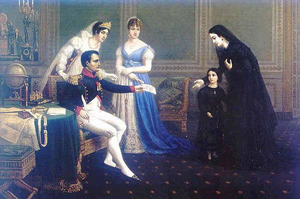 Napoleon, Josephine and Hortense receiving guests at court
Napoleon, Josephine and Hortense receiving guests at courtIt is Barras who introduces Rose to Napoleon Bonaparte, a promising Commander of the French army.
Less than two years after she left prison, Rose marries Napoleon. Napoleon does not like the name Rose. From now on Hortense's mum is known as Josephine de Beauharnais, the name that became famous all over the world. This marriage of Napoleon and Josephine dictates the rest of Hortense’s life. Napoleon's star rises, and he will not allow his family to stay behind.
Marriages are a political instrument that Napoleon uses to expand his power. Not only his own brothers and sister have to obey him. His stepdaughter and stepson will also live their lives mostly in his service, and of that of their demanding mother.
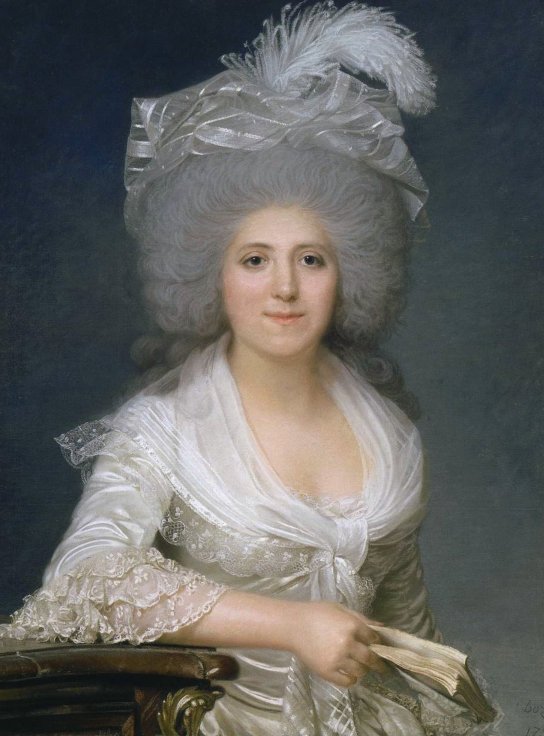 Jeanne_Louise_Henriette_Campan, better known as Mme Campan. She established a school at Saint-Germain-en-Laye and became friends with Hortense for life.
Jeanne_Louise_Henriette_Campan, better known as Mme Campan. She established a school at Saint-Germain-en-Laye and became friends with Hortense for life.In 1794 Hortense is admitted to the boarding school of Mme Campan, a former lady in waiting to Marie Antoinette. Mme Campan survived the revolution by hiding in the countryside. To provide for herself she started a boarding school for the daughters of the former aristocracy. Rose, just out of prison, cannot afford to pay the full school fee. After meeting Hortense Mme Campan is so charmed by her that she admits her anyway. They become friends for life.
Hortense loves it at the institute in Saint-Germain-en-Laye, and she excels there. As any young girl she has visions of romantic love, but Napoleon has other plans. By this time, he is First Consul of the French Republic. He and Josephine move from the Luxembourg Palace to the Tuileries Palace. Hortense has her own apartment in these palaces, but she prefers to stay in school.
The Bonaparte clan disapproves of Napoleon's marriage with the older and divorced Josephine. Hortense and Eugene are always very treated badly by them.
Napoleon himself is very fond of his stepchildren though. He finds them much more behaved, obedient and loyal than his own siblings. This obviously causes envy with the Bonaparte’s. So it is no surprise that Hortense never enjoys the family diners and meetings at court. She rather stays in her own little world, making and composing music, learning and reading.
Hortense de Beauharnais, Reine de Hollande ( Queen of Holland)
In 1802 Hortense is ready to get married, and Napoleon knows exactly the right guy for her. It is his own brother Louis Napoléon Bonaparte. Hortense is not at all thrilled by this match, but her mother Josephine encourages her.
She and Napoleon have their ulterior motives to promote this marriage. The marriage will strengthen Josephine’s own positions within the Bonaparte family. Napoleon and Josephine have been married for six years now, and it looks like they will not be having children together. People around him, especially his own family, are already encouraging him to divorce Josephine because of the lack of an heir.
Always thinking ahead, Napoleon had the following plan in mind. When Hortense and Louis Bonaparte got married and have a son, Napoleon would recognize this child as his heir. This way he can avoid divorcing Josephine and still have the Bonaparte name and bloodline intact. Hortense, obedient as she is, caves in, even though she is in love with Duroc, a military in Napoleon´s army.
The couple gets married and settle in the Rue Cerutti (nowadays Rue Laffitte) in Paris. Here the first two children are born, Napoléon Charles in 1802 and Napoléon Louis in 1804. In this same year, Napoleon and Josephine become the emperor and empress of France. Napoleon rearranged his pawns on his European playing field. Louis Napoléon is crowned king of Holland in 1806, and Hortense and the children follow him to the small country in the North.
She hates it! There is no real court life in Holland, the palaces are small and dark, the canals smell, and the weather is bad. Hortense only spends a few months in Holland during the reign of Louis, from 1806-1810.
By that time it is clear that her marriage is a failure. The final straw is the death of her first-born son in 1807. She is heartbroken and requests Napoleon to be allowed back to France. The reason she gives is that she fears for the life of her other son Napoléon Louis. In reality, she wants to leave the dreadful, lonely life in Holland and get away from her husband, who treats her like a prisoner.
Hortense goes back to Paris and stays in the Rue Cerutti again, without her husband. She travels through Europe to get her strength and spirits back. The birth of her third son is evidence of a short uplift of her marital life with Louis in 1807. This does not last and Hortense and Louis live separate lives from this point.
Louis is happy in Holland, and takes his job as King very serious, far more serious that Napoleon wants him to. The Dutch people become quite fond of him, as he tries to learn the language and defends the Dutch interests.
Napoleon thought he had sent a puppet on a string, but Louis becomes more and more unwilling to cooperate. This leads to his forced abdication in 1810.
By the time Hortense finds out she is pregnant with her third child, she knows that her husband has not changed a bit. He is maniacally jealous and never has any interest in the needs of his wife. She stays in Paris to give birth to Louis-Napoléon in April 1808. After that Napoleon allows her to stay there.
Napoleon still has a desire to adopt Napoléon Louis. He is afraid that the children might die in the Netherlands, like their oldest brother.
On December 15th, 1809 the divorce of Napoleon and Josephine is enounced at last. Napoleon needs an heir, and Hortense is not willing to give up her son to him. So he has to find a new wife who will give him children. Josephine is devastated, The Bonapartes are ecstatic, except for Napoleon himself. He cries during the ceremony.
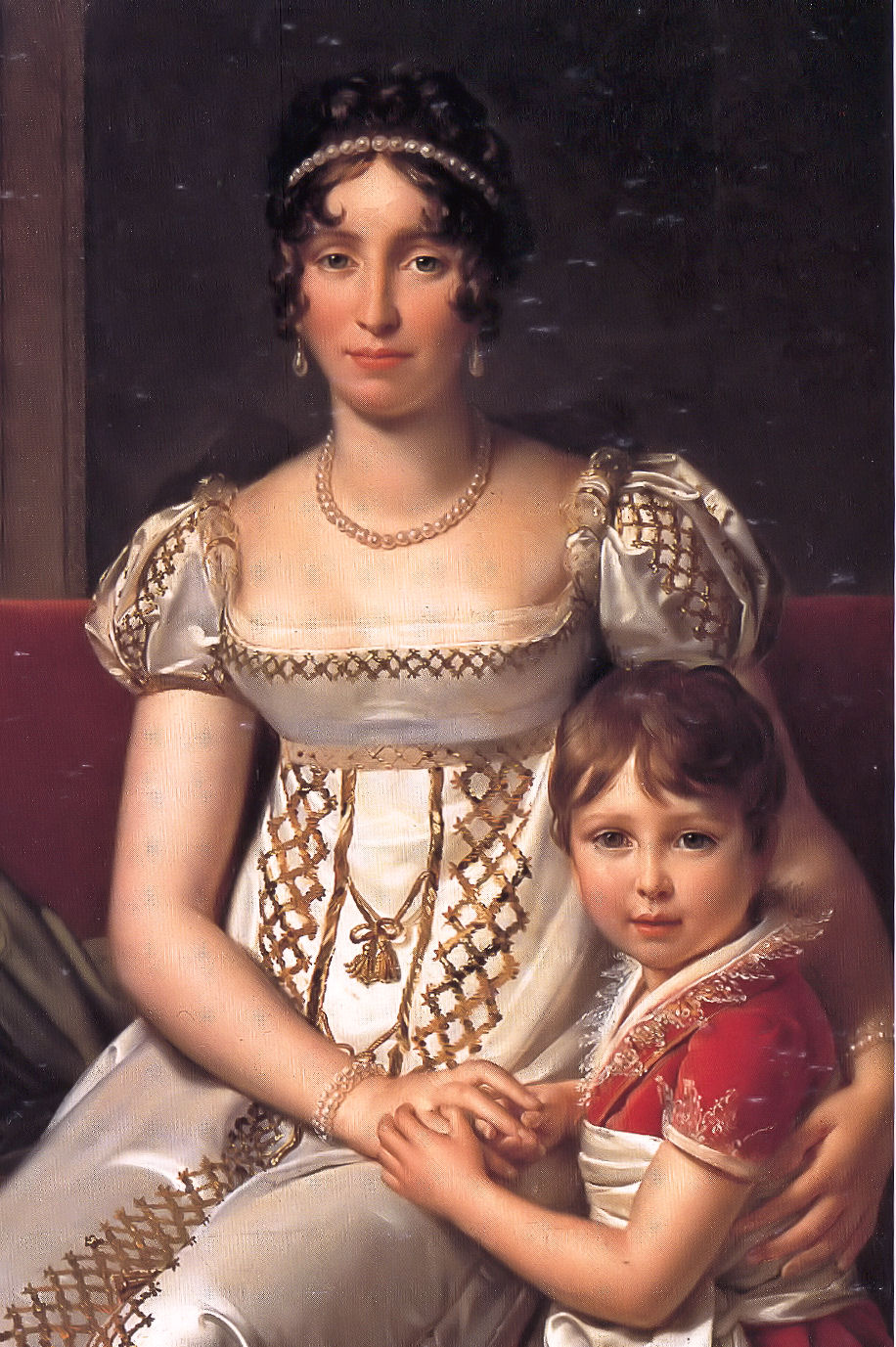 Hortense de Beauharnais with her son Napoleon Charles Bonaparte
Hortense de Beauharnais with her son Napoleon Charles BonaparteHortense only returns to Holland for a brief period in 1810. King Louis Napoléon forces Hortense to come back to Holland and Napoleon does not back her this time. He has found himself a new wife and feels it is not appropriate to have the daughter of his ex-wife at court. She agrees to go but leaves the little Louis-Napoléon in France.
She stays in Utrecht for a while, were Louis-Napoléon has created a new palace from old buildings at the Wittevrouwenstraat 1-11. Nowadays the University Library is located there. Then they leave for Amsterdam where Louis has confiscated the Paleis op de Dam. This large, ugly and cold place depresses Hortense even more. She is completely isolated there, and her health is deteriorating rapidly.
Louis allows her to leave for Paleis het Loo, in the countryside near Apeldoorn, to get some fresh air. She has to leave her oldest son behind though, and she finds no relief in ‘t Loo either. She realizes it is not the Dutch air that makes her sick. It is the suffocating relationship that she has with Louis. She makes up her mind and in 1810 she leaves her kingdom, king and son behind. She travels to Plombieres, allegedly to visit the thermal spa. She never returns.
Around the same time, King Louis Napoleon realizes that he can never win from his brother Napoleon. The French army is already knocking on the gates of Amsterdam. He takes desperate measures to keep his honour and to protect the interests of the Dutch Population. He knows they cannot win from the French army and would suffer immensely if he does not give in to his brother.
He abdicates on 1 July 1810 and names his oldest son Napoleon Louis the new King of Holland. Since the 5-year-old kid is not ready to rule, he names Hortense his regent! And in the middle of the night, he flees the country, leaving his son, King Louis II behind with his governess.
As soon as Hortense hears of Louis´s disappearance she sends someone to Holland to pick up her son. Napoleon beats her to it. He has the boy bring to Sains-Cloud, where he is reunited with his little brother and his grandmother Josephine. 9 days after the abdication of King Louis Napoleon Napoleon invades and annexes Holland into the French Empire.
Hortense´s secret love
Hortense, finally free to make her own decisions, takes the opportunity to live out a passion that had been hidden for years. She starts an affair with Charles de Flahaut. Charles is supposedly an illegitimate son of Talleyrand. Hortense stays in Genève, Switzerland at the time.
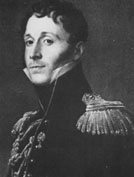 Charles de Flahaut, secret lover of Hortense de Beauharnais
Charles de Flahaut, secret lover of Hortense de BeauharnaisIn September 1811, Charles Auguste Louis Joseph, the future Duke of Morny is born. The only people who know about this illegitimate child from Hortense and Flahout are some of her closest companions. Two of them are her brother Eugène and Flauhouts mother, who takes the child with her and raises him.
Hortense goes back to Paris to live with her two legitimate sons, they stay in the Rue de Cerutti again. Her mother Josephine is no longer Napoleon´s wife, and Hortense and Louis are officially separated. Sill Napoleon treats Hortense as his daughter. She is welcome at court and he confides in her. She stands by him, even after Josephine’s death in 1814, and during Napoleon´s defeats at the end of his reign.
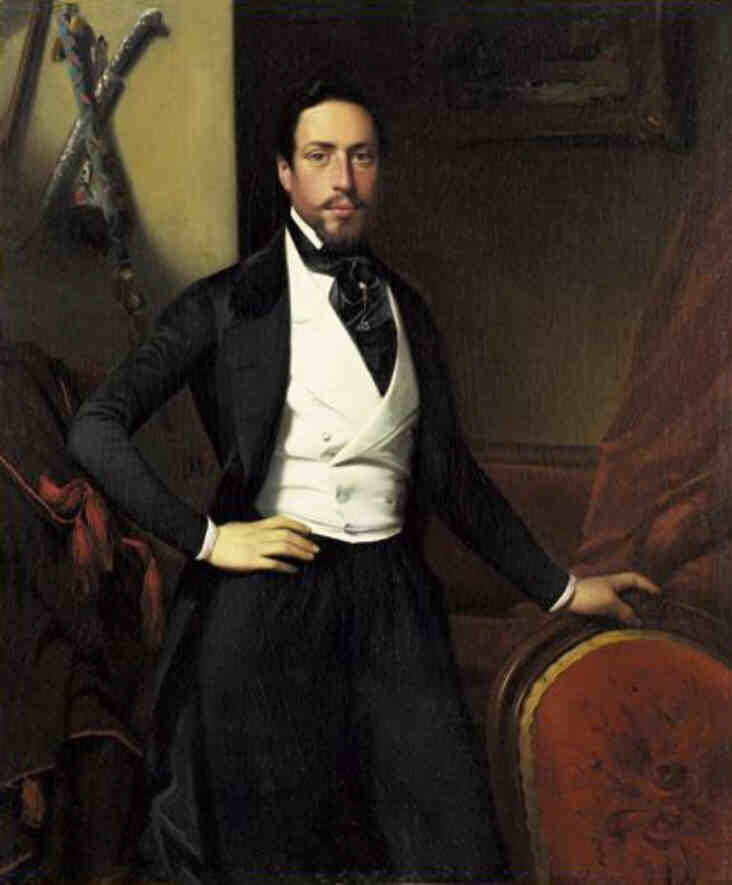 Charles Auguste Louis Joseph, Duc de Morny. The illegitimate son of Hortense de Beauharnais. He was raised by his grandmother and became close to Napoleon III, his half brother.
Charles Auguste Louis Joseph, Duc de Morny. The illegitimate son of Hortense de Beauharnais. He was raised by his grandmother and became close to Napoleon III, his half brother.During Napoleon’s first exile to the island of Elba Hortense and her mother retreat to Malmaison. They become close to Tsar Alexander I, the ´liberator’ of France. He makes sure that Hortense, Eugene and Josephine are treated well by the new Bourbon regime. They are allowed to keep Malmaison and stay there. Hortense receives the title Duchess of Saint-Leu from the new French King Louis XVIII.
Hortense´s loyalty remains with Napoleon though. When he escapes from Elba on 20 March 1815 and regains his empire, for what is now knows as the hundred days, she supports him.
After Napoleon's second defeat and exile to St. Helena, Hortense is not forgiven by his conquerors for a second time. She must flee Paris within hours and searches for a place to stay. Members of the Bonaparte family and their entourage are not welcome anywhere in Europe. Hortense stays In Aix en Savoy again for a while. This place had seen her ups and downs. Here she first engaged in the affair with Flahout, here she secretly gave birth to her illegitimate son and had to say farewell to him. Now she is here again, in 1815, persona-non-grata without allies and with further knock-backs to accept.
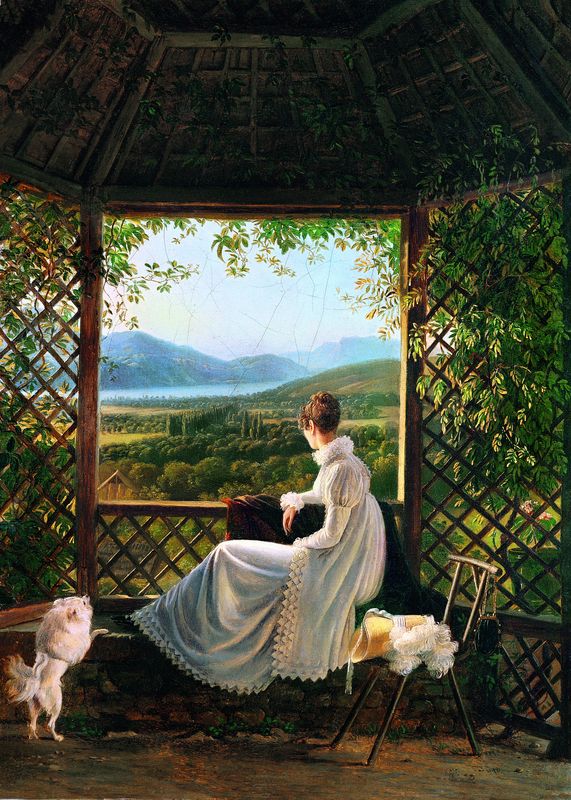 Hortense at Aix-les-Bains
Hortense at Aix-les-BainsAround this time her former husband Louis-Napoléon wins a custody case. Her oldest son Napoleon Louis s is taken away from her to live with his father in Italy. Hortense and Louis Napoleon stay behind, only to find out that they cannot stay in Aix. The Allied forces think it to be dangerous to have her living so near the French borders. She is not allowed to stay in her own house in Pregny, and only is allowed to stay in Baden for a couple of months.
Hortense still has one ally; her brother Eugene. He is married to a daughter of the King of Bavaria. He buys her a house in Augsburg, where she lives from 1817 -1824. Eugene visits her often. In 1818 Hortense and her youngest son travel to Italy to visit her eldest son.
In 1817 Hortense purchases the Château of Arenenberg in the Swiss canton of Thurgau. The castle has beautiful views on the Lake of Constans and the snowy mountains. She has her furniture from Paris brought and with her own unsurpassed taste she makes the place a charming home. The castle and the Lady of the house always attract many guests, which look up to her admiringly. Filled with music, dancing and discussions, the Chateau becomes a popular place for exiles. Many influential people want to be invited and introduced to Hortense. Unnecessary to say this is much to the annoyance of the new rulers of France.
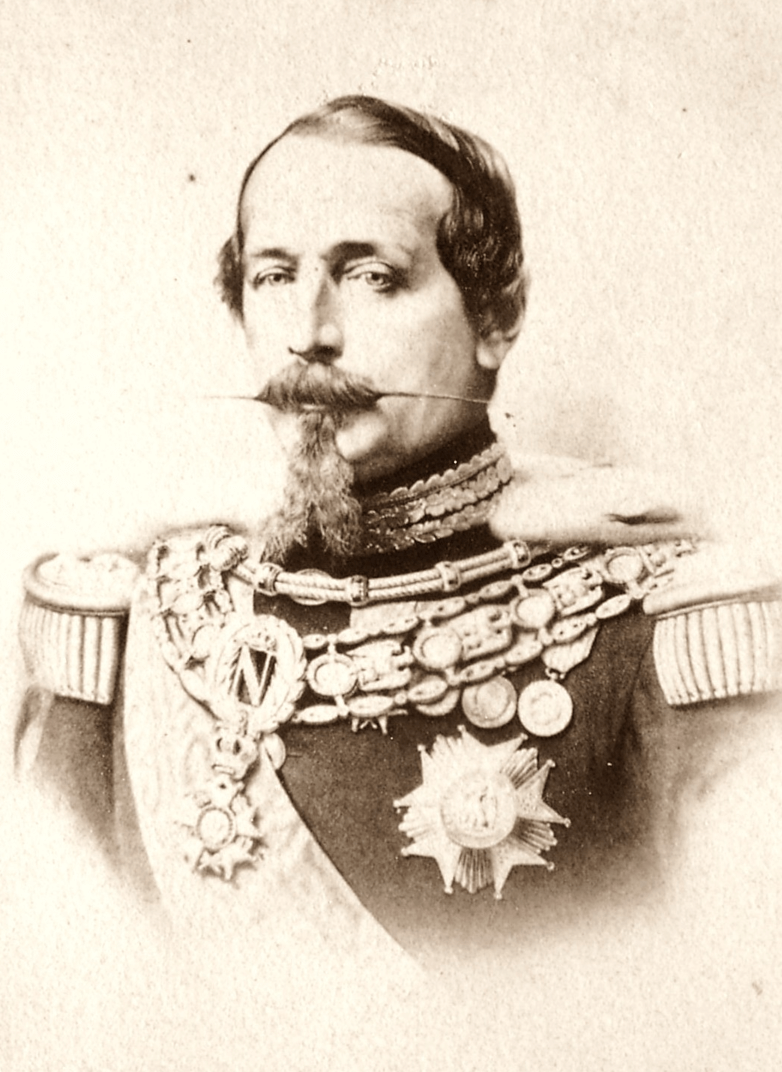 Charles Louis Napoléon Bonaparte, Napoléon III
Charles Louis Napoléon Bonaparte, Napoléon IIIYou would say Hortense has had enough adventures by then, but she has yet to go through another ordeal.
Hortense never allowed her sons to forget, even while in exile, that it might be their privilege to re-establish the French Empire.
In 1831 both Hortense’s sons live in Italy. They get involved in Republican and revolutionary factions in Italy fighting Austria's domination of northern Italy. During her annual visit to Italy, she finds herself in the middle of a riot, with her sons at the head of the rebels. Their father is furious but he is contained to his chair by the gout. He asks Hortense to call their sons to order, but she sympathizes with her sons. She decides to follow them and try bringing them to safety. What a disaster when she hears that her oldest suffers from measles or scarlet fever. When she gets to him in Forli. he is already dead!
There is no time to mourn; the Prince is buried hastily. Hortense and Louis-Napoléon, who has arrived in Forli in the meantime, flee to Ancona. They plan to board there to go to Corfu. Louis also becomes seriously ill. He caught the same illness that killed his brother. The situation seems desperate. The Austrian enemies are approaching, and Louis has to be gone before they get there.
Louis cannot be transported. Hortense hides him in the Palace of the Duke of Canino. This Duke happens to be Lucien Bonaparte, her brother-in-law. She has the Austrian believe that Louis has already fled and claims she herself was too ill to accompany him.
To make matters even worse the Austrian General moves into the same palace!
After some persuasion, she is allowed to stay in her rooms because she is ill. The Austrians have no clue of the presence of the rebel under their roof. This situation lasts for eight days. Finally, the physician gives the real patient permission to travel.
There they go again, fleeing across Europe to find a safe haven. The first smart move Hortense makes, she flees to France. No one would suspect them to go there. After a dangerous quest, they make it to Paris where they stay in the Hotel du Holland. Hortense meets with king Louis-Philippe. He is not amused to see her and does not allow them to stay very long. Their presence is become known in Paris and attracts a crowd of mourners for Emperor Napoleon on the tenth anniversary of his death on May 5th, 1831. They are ordered to leave Pairs immediately and take refuge in England. Louis-Napoléon stays there, as Hortense goes back to the Arenenberg.
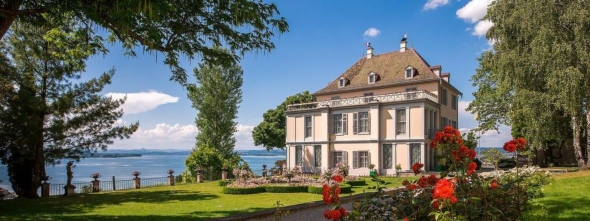 Château of Arenenberg at the shore of Lake Constance
Château of Arenenberg at the shore of Lake Constanceuncover the fascinating life of Hortense de Beauharnais, pick up a book!
As an Amazon Associate I earn from qualifying purchases.
- Memoirs of Hortense Beauharnais, Duchess of St. Leu, Ex-Queen of Holland by Hortense de Beauharnais
This is the autobiography of Hortense de Beauharnais herself, offering a firsthand account of her life as a daughter of Napoleon's first wife, Josephine, her marriage to Napoleon's brother Louis, and her experiences as Queen of Holland. - Daughter to Napoleon;: A biography of Hortense, Queen of Holland by Constance Wright
- Hortense de Beauharnais: by François Jarry (French language only)
This biography by François Jarry delves deeper into Hortense's life, providing a more comprehensive perspective on her experiences and significance.
Hortense de Beauharnais spends the last years of her life overlooking Lake Constance, surrounded by friends and admirers. In 1837 Hortense falls ill. Most likely she suffers from uterus cancer. Her son lives in America at this time, but travels to Swiss as soon as he hears the news. He arrives just in time. His mother dies on 5 October, 1837. According to her wishes she is buried in the Saint-Pierre-Saint-Paul Church of Rueil-Malmaison, next to her mother Josephine.
